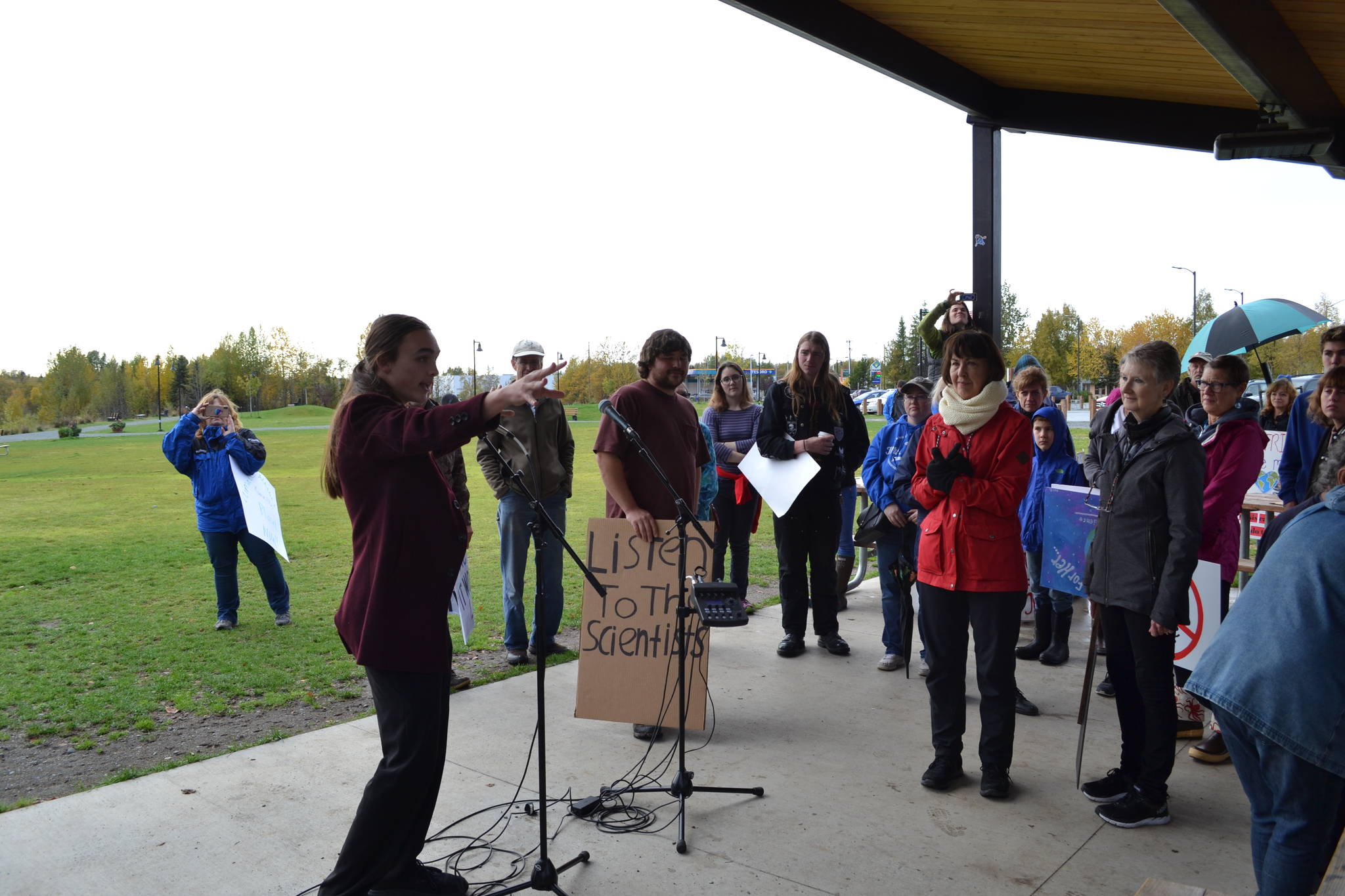Residents of Soldotna joined organizers across the globe Friday to demand politicians take action to address climate change.
On Friday evening, dozens of people gathered at Soldotna Creek Park, holding signs that read, “Don’t be a fossil fool,” “There is no Planet B,” and “Keep Alaska Cool.”
The event was organized by local high school students and youth activists Kaegan Koski and Eve Downing with the help of local environmental advocacy group Cook Inletkeeper. Soldotna’s march was part of the Global Climate Strike, a series of demonstrations inspired in part by the activism of Swedish teenager Greta Thunberg.
Over the past year, Thunberg has staged weekly demonstrations urging governments to take action to save the environment. Climate Strike organizers reported strikes in more than 150 countries. The Associated Press reported hundreds of thousands of people participating strikes in U.S. cities and countries around the world.
Before marching down the Sterling Highway, Kaitlin Vadla of Cook Inletkeeper taught the protesters a short song written especially for the day:
“People gonna rise like the water,
Gonna calm this crisis down.
I hear the voice of my great-granddaughter,
Saying keep it in the ground.”
The protesters then made their way down the Sterling Highway to the Kenai Spur Highway intersection, with Koski leading the way.
“It scares me how apathetic I can be about this issue, not just others,” Koski said when asked why he decided to lead Friday’s strike. “I think it’s really important that I keep doing things like this, because right now it’s not as much of an issue as it needs to be, and I think a lot of people would agree with me.”
Many drivers honked at the protesters as they walked by, with some raising their fists in solidarity and others raising their fingers in opposition.
Upon reaching the intersection where the Sterling Highway meets the Kenai Spur Highway, the protesters spread out to different corners of the intersection to sing and display their signs along the road.
Younger kids, teenagers and adults of all ages participated in the strike, and each had their own take on why the issue of climate change is important to them and what kinds of change they want to see.
“Why am I here?” Nikiski resident Debbie McKay said. “To save the Earth.”
About 50 people participated in the protest, and McKay said that she wished the turnout had been as big as a Wednesday Market or the Kenai River Festival, but she was inspired by the younger generations leading the charge.
“I’m here to help draw attention to the severe crisis we have happening right now,” Rebecca Lambourn of Kenai said. “On a local level, I think that we as Alaskans need to let our politicians know how we feel about this.”
Lambourn recently traveled to the village of Seldovia, where the residents recently faced a water shortage that was the result of an extended drought on the peninsula.
“We’re seeing the drastic effects of warming temperatures,” Lambourn. “I think that we need to wake up.”
“We’re here because we care about the planet and we don’t want climate change to go on any longer,” Audrey Hobart-Anderson said. “In 20 or 30 years the planet won’t be as sustainable as it was before, and that’s kind of an important issue.”
Hobart-Anderson is 10 years old and a student at Kaleidoscope Elementary, and she attended the march with her mother and brother. She said she and her family recycle as much as they can to do their part, but she also thinks it’s important to let the borough know that people want to see something done.
Soldotna’s Climate Strike was just as much about taking action as it was about marching. During the event, participants passed around and signed a petition asking the Kenai Peninsula Borough to incorporate a Climate Action Plan into their 2019 Comprehensive Plan. The language of the petition urges the assembly to include plans for adapting to environmental changes, developing a renewable energy strategy with a target of 40% greenhouse gas reduction by 2030 and strategies to improve recycling infrastructure and composting on the borough level.
‘The earth is dying,” Sophie Crawford said. “Earth gave us a home and we repaid it with greed and selfishness.”
Crawford is 18 and recently graduated from Kenai Central High School. Crawford said that individual changes like using reusable coffee cups and water bottles are important, but so is reducing the community’s carbon footprint on a large scale. Crawford is happy to see people her age lead the way in the climate advocacy movement, and fellow marcher Patrick Murray was in agreement.
“Just like the Vietnam War, the students have got to speak up and save us from this crazy government,” Murray said.
Murray said that anyone who’s lived in Alaska for a long time should be able to see that things are changing fast. Murray used to be an oil well driller and said that people of every industry should be fighting for changes in how energy is produced and consumed.
“We don’t have to stop drilling oil wells, and we don’t have to stop driving our cars or flying airplanes, but we’ve gotta work for changes that we know are cleaner ways for the future,” Murray said.
Once the marchers had returned to the park, an open mic was set up and participants were invited to give speeches or sing songs. Some spoke about hope for the future, and others spoke about the failures of the past. Peggy Mullen, owner of River City Books in Soldotna, read a newspaper from 1994 that included information about global warming and the greenhouse effect.
“I am so impressed with the young people here, and I’m sorry we’re leaving you such a mess,” Mullen said. “But we’ll do what we can to support you.”

